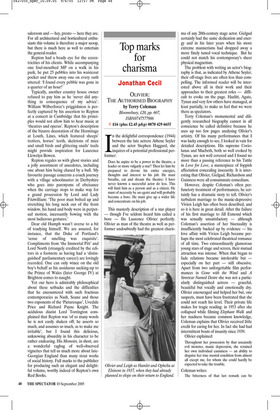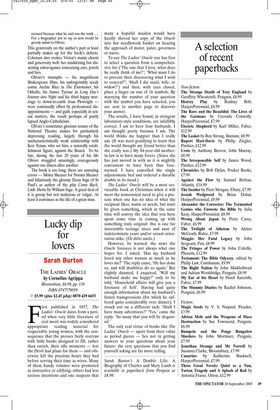Top marks for charisma
Jonathan Cecil
OLIVIER: THE AUTHORISED BIOGRAPHY by Terry Coleman Bloomsbury, £20, pp. 607, ISBN0747577986 ✆ £16 (plus £2.45 p&p) 0870 429 6655 In the delightful correspondence (1944) between the late actress Athene Seyler and the actor Stephen Haggard, she inquires of a potential professional performer:
Does he aspire to be a power in the theatre, a leader or more vulgarly a star? Then let him be prepared to devote his entire energies, thoughts and interest to his job. He must breathe, eat and dream the theatre: I have never known a successful actor do less. This will limit him as a person and as a citizen. He must of necessity be an egoist and will probably become a bore. He must give up a wider life and concentrate on his job.
This masterly description of a star player — though I’ve seldom heard him called a bore — fits Laurence Olivier perfectly. Olivier as man of the theatre as well as performer undoubtedly had the greatest charis ma of any 20th-century stage actor. Gielgud certainly had the same dedication and energy and in his later years when his more extreme mannerisms had dropped away a more finely tuned vocal technique. But he could not match his contemporary’s sheer physical magnetism.
The problem with writing an actor’s biography is that, as indicated by Athene Seyler, their off-stage lives are often less than compelling. The informed reader will be interested above all in their work and their approaches to their greatest roles — difficult to evoke on the page. Hazlitt, Agate, Tynan and very few others have managed, at least partially, to make us feel that we were there as spectators.
Terry Coleman’s monumental and diligently researched biography cannot in all conscience be called definitive because he uses up too few pages analysing Olivier’s artistry. Of his many performances that I was lucky enough to see, I looked in vain for detailed descriptions. His supreme Coriolanus and Macbeth, both so well evoked by Tynan, are not well covered and I found no more than a passing reference to his Tattle in Love for Love, a masterpiece of foppish affectation concealing insecurity. It is interesting that Olivier, Gielgud, Richardson and Guinness were all consummate comedians.
However, despite Coleman’s often perfunctory treatment of performances, he certainly has a dramatic story to tell. Olivier’s turbulent marriage to the manic-depressive Vivien Leigh has often been described, and so it is here in great detail. After the failure of his first marriage to Jill Esmond which was sexually unsatisfactory — although Coleman’s assertion of her bisexuality is insufficiently backed up by evidence — his love affair with Vivien Leigh became perhaps the most celebrated theatrical romance of all time. Two extraordinarily glamorous young stars of stage and screen, their mutual attraction was intense. When that began to fade relations became intolerable but especially on her part — still obsessive. Apart from two unforgettable film performances in Gone with the Wind and A Streetcar Named Desire she was not a particularly distinguished actress — graceful, beautiful but vocally and emotionally dry. Olivier encouraged and helped her but, one suspects, must have been frustrated that she could not reach his level. Their private life makes for tragic reading: in 1953 after she collapsed while filming Elephant Walk and her madness became common knowledge, Coleman explains that Olivier received little credit for caring for her. In fact she had had intermittent bouts of insanity since 1939.
Olivier explained:
Throughout her possession by that uncannily evil monster, manic depression, she retained her own individual canniness — an ability to disguise her true mental condition from almost all except me, for whom she could hardly be expected to take the trouble.
Coleman writes:
The bitterness of that last remark can be excused because what he said was the truth .... For a biographer not to say so now would be grossly unfair to Olivier.
This generosity on the author’s part at least partially makes up for the book’s defects. Coleman also evokes Vivien’s manic charm and generosity well: her maddening but disarming extravagance concerning cars, jewels and furs.
Olivier’s triumphs — his magnificent Shakespeare films, his unforgettably seedy comic Archie Rice in The Entertainer, his Othello, his James Tyrone in Long Day’s Journey into Night and his third happy marriage to down-to-earth Joan Plowright were continually offset by professional disappointments — and guilt, especially in sexual matters, the result perhaps of partly lapsed Anglo-Catholicism.
Olivier’s sometimes glorious tenure of the National Theatre makes for particularly depressing reading, largely through his uncharacteristically weak relationship with Ken Tynan, who set him, a naturally establishment figure, against the Board. To be fair, during the last 20 years of his life Olivier struggled amazingly, courageously against one illness after another.
The book is too long; there are annoying errors — Moira Shearer for Norma Shearer and hilariously the gloomy Dean Inge of St Paul’s as author of the play Come Back, Little Sheba by William Inge. A great deal of it is gossip but not malicious or vulgar. At least it convinces as the life of a great man.

























































 Previous page
Previous page